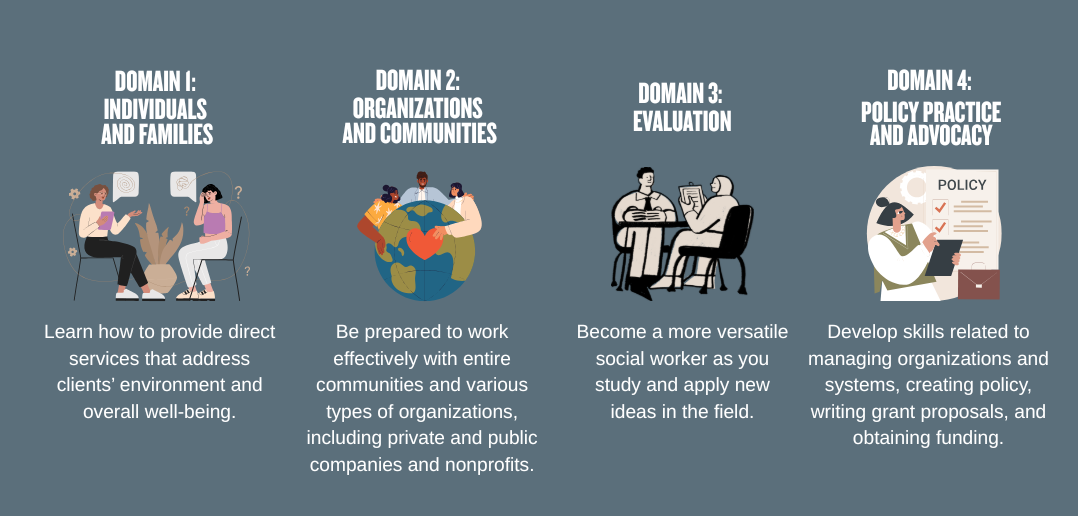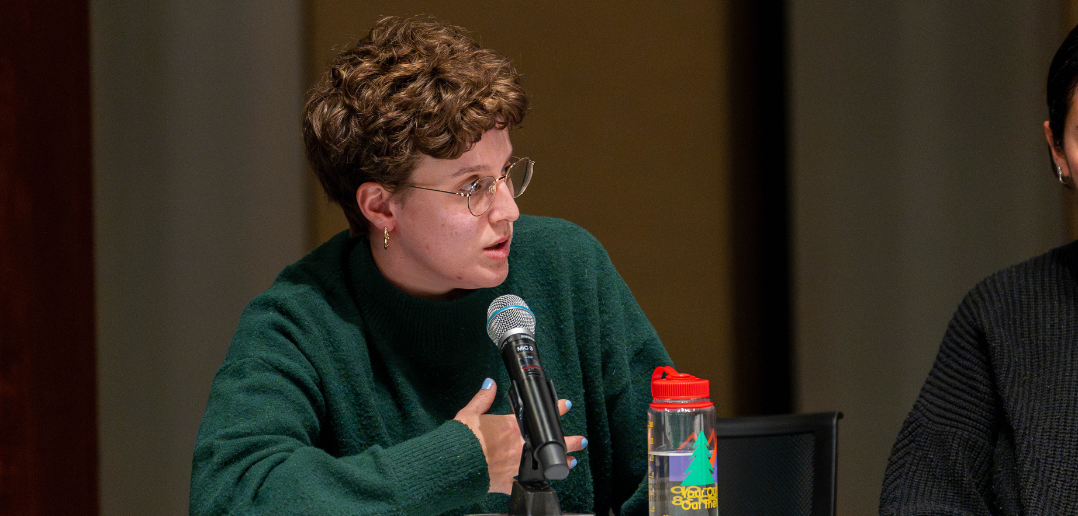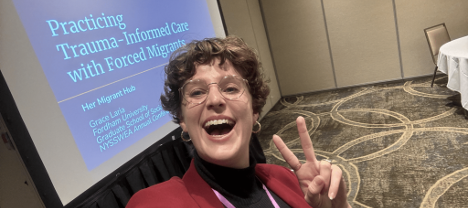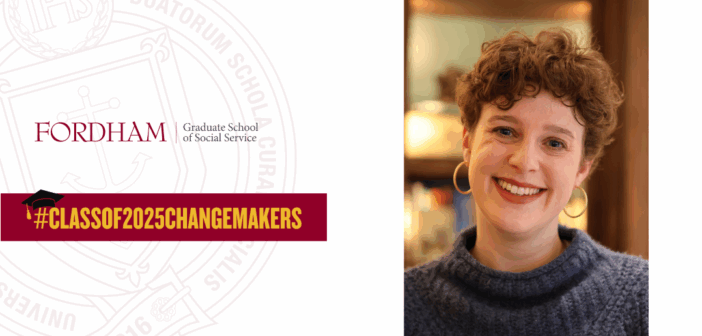As part of the Graduate School of Social Service’s “Class of 2025 Changemakers” series, we’re spotlighting graduating students transforming their professional paths through the Master of Social Work (MSW) program.
During her first field placement as a Master of Social Work (M.S.W.) student at Fordham’s Graduate School of Social Service, Grace Laria, GSS ’25, met with asylum seekers who had arrived in New York City on buses from Texas just three days earlier.
“I was witnessing a moment in history that was very particular to New York,” she said.
As an intern with the Asylum Application Help Center—a pro se clinic created by the City—Laria helped the influx of migrants navigate this foreign system and complete their application processes. The internship built on her previous experience as a paralegal, but now, Laria was seeing things through a holistic lens. A social worker’s lens.
“I felt very lucky to be able to meet those people and hear their stories,” she said. “That wouldn’t have happened if I weren’t living in New York and going to social work school here.”
The experience taught Laria that to be an effective social worker in immigration services, you need to be well-rounded. As she graduates this May and heads into the field, she credits the Graduate School of Social Service’s unique curriculum and Fordham’s deeply rooted Jesuit values for helping transform her into the holistic advocate this population needs.
The Route to Social Work
Laria has always felt called to this work, completing an undergraduate degree in foreign service at Georgetown and double-minoring in Spanish and Latin American studies. After graduation, she began a career in legal services, working as a paralegal with detained immigrant minors. She loved the work, but felt limited within the legal system’s scope.
“There was always a limit to what we could do as immigration legal services providers, either as attorneys or paralegals,” she said. “We got great results for our clients, but I wanted to have a more creative approach to problem solving.”

GSS domains
Laria highlighted Fordham’s unique M.S.W. curriculum structure as an initial attraction. After a student’s generalist phase of 8 core classes, they can individually choose their remaining eight courses, which GSS calls “Selectives.” Each student must take at least one course in one of GSS’s four study domains and have unlimited choice for the remaining four courses. This policy, Laria said, produces a wrap-around education that prepares adaptable practitioners.
“The Jesuit aspect of being well-rounded is maybe a reason why Fordham is structured in that way,” Laria said. “Every social worker at Fordham has some foundation in community and organizational work, individual work, policy, and research.”
Although Laria has had her sights on immigration services for some time, she didn’t always know social work could get her there. When she began researching the profession as a paralegal, she’d yet to learn about the macro and mezzo aspects of the work, which allow social workers to play crucial roles in program design, community needs assessments, and international issues.
One conversation with Fordham GSS Professor Marciana Popescu, Ph.D., changed things completely. Laria and Popescu connected through an admissions director. Popescu explained the different macro and mezzo opportunities at Fordham, including Her Migrant Hub (HMH)—a project Popescu created to provide mental health care access to NYC women asylum seekers.
“That made me really excited about the opportunities I could pursue at Fordham,” Laria said. “In addition to the course selection structure that I really liked, I was like, ‘Okay, I know I can do this work at Fordham,’ and that’s what drew me to the school.”
New York City: Fordham’s Learning Laboratory
Laria soon learned that Fordham M.S.W. students don’t just learn about social justice concepts; they practice them in real time.
As she went through the program, Laria stayed connected with Popescu and HMH. Laria’s two field placements at the Asylum Application Center and New York Immigration Coalition were unique in that each of them contained an HMH component; Laria led migrant support groups, spoke at panel discussions, and evaluated training programs, all under Popescu’s guidance.
“I’ve been able to build on a lot of different skills at Fordham and through my social work internships,” Laria said. “It all feels very cohesive within the thread of immigration justice work. I feel very prepared for the sort of jobs that I want to pursue in the future.”

Laria participating in an HMH panel discussion at Fordham University in December 2024
Laria said Popescu places immense trust in her student interns to get the job done. This relationship heightens the field experience and increases the number of opportunities to get hands-on training.
“[Dr. Popescu] has a level of confidence in her students—she’s just very much like, ‘Go out there and get it,’” Laria said. “She’s so willing to put you in touch with the right people, to give you new experiences, and to let you take leadership roles.”
And with New York City acting as an extension of the classroom, leadership opportunities present themselves often. Laria said one of her most memorable moments in the program was implementing a co-facilitation model with two support groups for immigrant women, one for recent arrivals to the United States and another for single mothers. Her co-facilitators for both groups were former participants who gradually stepped into leadership positions and became responsible for running the group with Laria’s support. This way, they can continue the groups even after Laria graduates, which aligns with social work’s mission to empower communities to support themselves.
“It has been incredible to watch a group of strangers come together and become this supportive, self-sustaining community,” Laria said. “That was a great example of putting a lot of the lessons I learned in the classroom into practice, letting the communities be their own agents of change.”
An Interdisciplinary Future
While mental health issues and rapid policy changes impact innumerable lives, social workers must be knowledgeable and adaptable in a wide range of skills to meet their clients’ needs. Laria said Fordham prepares students for a world in flux with the tools they need to succeed.
“[An M.S.W. program] is what you make of it,” she said. “There are a lot of opportunities for even clinical social workers to engage in mezzo and macro work and research. [Don’t] be afraid of being open to those other opportunities. The more integrated we become, the better our profession will be.”

Laria presents at the NYSSWEA Annual Conference in October 2024
Laria sees her own interdisciplinary skillset, formed from her legal background and M.S.W. education, as critical upon entering the workforce in immigration services. In her previous work experience, Laria saw legal professionals and social workers underutilize their capacity for collaboration. She wants to bridge that gap to produce even better results.
Finally, Laria hopes to create client-centered change. What her Fordham M.S.W. coursework and internships with HMH taught her, above all, was that the clients are experts in their own lives—and are often changemakers themselves. Social workers need to empower that inherent capacity and drive.
“We can be agents of change as social workers, but the best and most ethical way to do that is by working directly with affected communities and recognizing that these are the individuals who are going to be best suited to making the changes that our society needs to see,” she said. “[We need to acknowledge] that these communities are the experts in their own lives and [work]beside them, not come in as outsiders and offer solutions, but listen to how they think the change should happen.”



